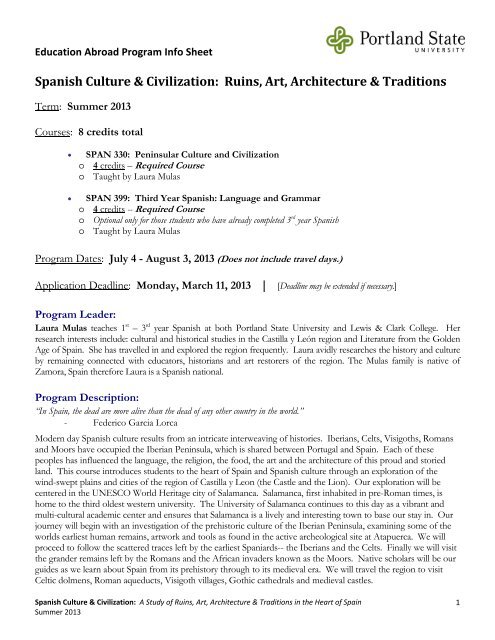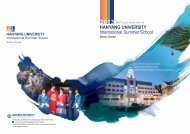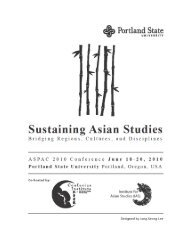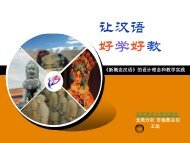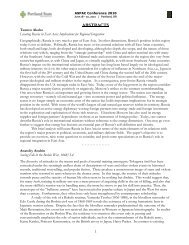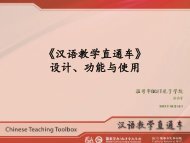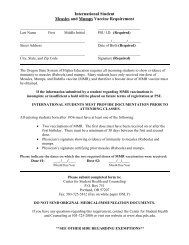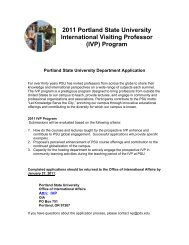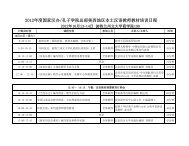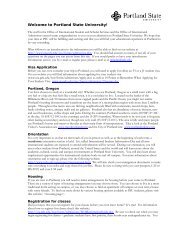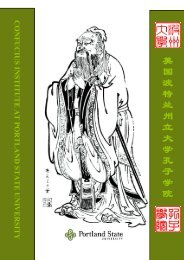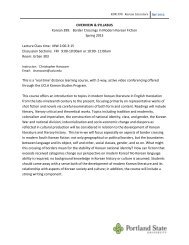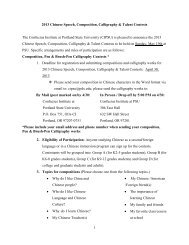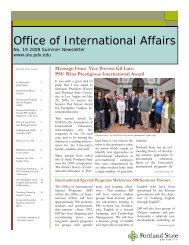Spanish Culture & Civilization - Office of International Affairs ...
Spanish Culture & Civilization - Office of International Affairs ...
Spanish Culture & Civilization - Office of International Affairs ...
Create successful ePaper yourself
Turn your PDF publications into a flip-book with our unique Google optimized e-Paper software.
Education Abroad Program Info Sheet<br />
<strong>Spanish</strong> <strong>Culture</strong> & <strong>Civilization</strong>: Ruins, Art, Architecture & Traditions<br />
Term: Summer 2013<br />
Courses: 8 credits total<br />
SPAN 330: Peninsular <strong>Culture</strong> and <strong>Civilization</strong><br />
o 4 credits – Required Course<br />
o Taught by Laura Mulas<br />
SPAN 399: Third Year <strong>Spanish</strong>: Language and Grammar<br />
o 4 credits -- Required Course<br />
o Optional only for those students who have already completed 3 rd year <strong>Spanish</strong><br />
o Taught by Laura Mulas<br />
Program Dates: July 4 - August 3, 2013 (Does not include travel days.)<br />
Application Deadline: Monday, March 11, 2013 | [Deadline may be extended if necessary.]<br />
Program Leader:<br />
Laura Mulas teaches 1 st – 3 rd year <strong>Spanish</strong> at both Portland State University and Lewis & Clark College. Her<br />
research interests include: cultural and historical studies in the Castilla y León region and Literature from the Golden<br />
Age <strong>of</strong> Spain. She has travelled in and explored the region frequently. Laura avidly researches the history and culture<br />
by remaining connected with educators, historians and art restorers <strong>of</strong> the region. The Mulas family is native <strong>of</strong><br />
Zamora, Spain therefore Laura is a <strong>Spanish</strong> national.<br />
Program Description:<br />
“In Spain, the dead are more alive than the dead <strong>of</strong> any other country in the world.”<br />
- Federico Garcia Lorca<br />
Modern day <strong>Spanish</strong> culture results from an intricate interweaving <strong>of</strong> histories. Iberians, Celts, Visigoths, Romans<br />
and Moors have occupied the Iberian Peninsula, which is shared between Portugal and Spain. Each <strong>of</strong> these<br />
peoples has influenced the language, the religion, the food, the art and the architecture <strong>of</strong> this proud and storied<br />
land. This course introduces students to the heart <strong>of</strong> Spain and <strong>Spanish</strong> culture through an exploration <strong>of</strong> the<br />
wind-swept plains and cities <strong>of</strong> the region <strong>of</strong> Castilla y Leon (the Castle and the Lion). Our exploration will be<br />
centered in the UNESCO World Heritage city <strong>of</strong> Salamanca. Salamanca, first inhabited in pre-Roman times, is<br />
home to the third oldest western university. The University <strong>of</strong> Salamanca continues to this day as a vibrant and<br />
multi-cultural academic center and ensures that Salamanca is a lively and interesting town to base our stay in. Our<br />
journey will begin with an investigation <strong>of</strong> the prehistoric culture <strong>of</strong> the Iberian Peninsula, examining some <strong>of</strong> the<br />
worlds earliest human remains, artwork and tools as found in the active archeological site at Atapuerca. We will<br />
proceed to follow the scattered traces left by the earliest Spaniards-- the Iberians and the Celts. Finally we will visit<br />
the grander remains left by the Romans and the African invaders known as the Moors. Native scholars will be our<br />
guides as we learn about Spain from its prehistory through to its medieval era. We will travel the region to visit<br />
Celtic dolmens, Roman aqueducts, Visigoth villages, Gothic cathedrals and medieval castles.<br />
<strong>Spanish</strong> <strong>Culture</strong> & <strong>Civilization</strong>: A Study <strong>of</strong> Ruins, Art, Architecture & Traditions in the Heart <strong>of</strong> Spain<br />
Summer 2013<br />
1
Students will stay in the city <strong>of</strong> Salamanca, whose historic center has important Romanesque, Gothic, Moorish,<br />
Renaissance and Baroque monuments. Free time is built into the schedule to allow participants to explore presentday<br />
Spain, through its food, its festivals, its sports, and its friendly peoples. The program integrates aspects <strong>of</strong><br />
<strong>Spanish</strong> literature, art, architecture and language as we explore the politics, culture and civilization <strong>of</strong> Spain. Come<br />
and share this journey with us, an exploration <strong>of</strong> an ancient, multi-layered and still vibrant culture.<br />
Salamanca’s small size belies the important role it has played in <strong>Spanish</strong> history. Situated in the southwestern<br />
corner <strong>of</strong> the province <strong>of</strong> Castilla y Leon, on a flat granite-plain, the city was first settled by Celtic and Iberian<br />
tribes. Its most enduring symbol (found even on the ancient coat-<strong>of</strong>-arms) is its Roman bridge. The city was<br />
subsequently held and influenced by Visigoths, Moors and finally <strong>Spanish</strong>-Christians. The University <strong>of</strong> Salamanca<br />
was founded in 1134. Today it is the third oldest university in continuous operation in Europe, and is a leading<br />
center <strong>of</strong> <strong>Spanish</strong>-language education. As a result, Salamanca is home to a lively and diverse student body. The city<br />
is home to numerous architectural treasures, from its ancient Roman walls to its golden-age palaces, from its<br />
Romanic churches to its baroque Plaza Mayor, the center <strong>of</strong> the city's vibrant nightlife. Salamentinos, Spaniards<br />
and international students make up a fascinating mix <strong>of</strong> peoples, socializing and partaking in a vibrant example <strong>of</strong><br />
<strong>Spanish</strong> life. The city’s location also lends itself to tourism in the nearby cities <strong>of</strong> Segovia, Avila and Madrid.<br />
The objective <strong>of</strong> this course is to expose students to <strong>Spanish</strong> culture through an exploration <strong>of</strong> history, literature,<br />
architecture, art and traditions. At the end <strong>of</strong> this course the student will be able to:<br />
Identify the main historical factors that contributed to contemporary <strong>Spanish</strong> culture<br />
Identify specific contributions to <strong>Spanish</strong> culture made by the varied peoples that have historically<br />
occupied the Iberian Peninsula<br />
Course Information:<br />
SPAN 330 Peninsular <strong>Culture</strong> and <strong>Civilization</strong> 4 credits<br />
*SPAN 399 Third Year <strong>Spanish</strong>: Language and Grammar 4 credits<br />
*Important Note: SPAN 399- Third year <strong>Spanish</strong>: Language and Grammar is required for students who have not<br />
completed third year <strong>Spanish</strong>.<br />
Program Dates:<br />
Please renew or apply for your passport now! [Unless your passport does not expire before Feb 3, 2014]<br />
This program includes some course meetings prior to departure<br />
The international component runs: July 4—August 3, 2013<br />
Draft Itinerary:<br />
After arriving in Burgos we will meet as a group in the evening to have dinner and discuss the program. The following<br />
day will be spent visiting Atapuerca and on Day 3 we will tour Burgos and discuss important sites. The following day<br />
en route to Salamanca we will discuss further details <strong>of</strong> the program as well as visits some important sites along our<br />
way. Classroom time is built in to each week to include instruction, discussions and in class writings related to our<br />
studies/explorations/discoveries. There will be "in vivo" studies that will occur in Burgos, Salamanca, Zamora,<br />
Segovia and Ávila, which, will entail a mixture <strong>of</strong> lecture, touring, and self guided explorations. All sites, architecture,<br />
and art that we explore will follow a specific timeline with discussion <strong>of</strong> its emergence and characteristics. Typically on<br />
our exploration days we will lunch together and evenings will be free.<br />
<strong>Spanish</strong> <strong>Culture</strong> & <strong>Civilization</strong>: A Study <strong>of</strong> Ruins, Art, Architecture & Traditions in the Heart <strong>of</strong> Spain<br />
Summer 2013<br />
2
Participants will be expected to explore the city we are in and experience daily life in their free time. They are required to<br />
attend at least one (per week) cultural event, festival, tour or any like activity that lends its way to experiencing culture.<br />
Each event will be documented in their journal as a reflection entry and will be presented in our group meetings. Every<br />
weekend will be entirely free and may include some optional extracurricular activities (at an extra cost).<br />
The information <strong>of</strong>fered below is provided to give students a general sense <strong>of</strong> the program structure and activities. As with any<br />
international travel <strong>of</strong> this nature, participants should expect that program itineraries and activities may change during the course <strong>of</strong><br />
the program in response to local conditions and needs.<br />
Day Date Tentative Schedule<br />
Day 0 Depart Portland for Spain<br />
Day 1 Thurs, July 4<br />
Arrival: students responsible for train or bus to Burgos, meet briefly to introduce<br />
course, afternoon free/meet for dinner<br />
Day 2 Fri, July 5 Pre-roman (earliest humans--Neolithic and iron age), Field trip to Burgos- Atapuerca<br />
Day 3 Sat, July 6<br />
Day 4 Sun, July 7<br />
Day 5 Mon, July 8<br />
Day 6 Tue, July 9<br />
Day 7 Wed, July 10<br />
Day 8 Thur, July 11<br />
Day 9 Fri, July 12<br />
Day 10 Sat, July 13 Free day.<br />
Day 11 Sun, July 14 Free day.<br />
Morning tour <strong>of</strong> Burgos, Guided and educational tours -"El Cid" sites, birthplace,<br />
burial site, Santo Domingo de Silos= birthplace <strong>of</strong> <strong>Spanish</strong><br />
Morning departure via bus to Salamanca with stops along the way: Clunia, Baños de<br />
Valdearados, Lunch in Valladolid<br />
Afternoon and evening free in Salamanca<br />
Morning class (9-11am): The early beginnings <strong>of</strong> Spain.<br />
Afternoon class (12-2pm): Language class.<br />
Afternoon self-guided tour <strong>of</strong> Salamanca using the given seek and find assignment<br />
Morning: Language Class & Afternoon Exploration: Early history; Continue discussion <strong>of</strong> El Cid<br />
Evening Free<br />
Morning class (9-11am): History & <strong>Culture</strong> <strong>of</strong> Spain<br />
Afternoon class (12-2pm): Language class<br />
Site visits in Salamanca (4-6pm): Roman Bridge over Tormes<br />
Morning: Language Class & Afternoon Explorations related to History & <strong>Culture</strong> <strong>of</strong> Spain<br />
Evening Free<br />
Day trip to Segovia: Roman aqueduct, Moorish related sites, Jewish synagogue<br />
(Language class en route)<br />
Day 12 Mon, July 15<br />
Morning class (9-11am): History & <strong>Culture</strong> <strong>of</strong> Spain<br />
Afternoon class (12-2pm): Language class<br />
Site visits in Salamanca (4-6pm)<br />
Day 13 Tue, July 16 Day field trip to Ávila: Medieval wall, Gothic, Sta. Teresa-related sites<br />
Day 14 Wed, July 17<br />
Morning class (9-11am): History & <strong>Culture</strong> <strong>of</strong> Spain<br />
Afternoon class (12-2pm): Language class<br />
Day 15 Thur, July 18 Site visits in Salamanca (4-6pm): Related to history<br />
Day 16 Fri, July 19 Salamanca related activities- TBA<br />
Day 17 Sat, July 20 Free day.<br />
<strong>Spanish</strong> <strong>Culture</strong> & <strong>Civilization</strong>: A Study <strong>of</strong> Ruins, Art, Architecture & Traditions in the Heart <strong>of</strong> Spain<br />
Summer 2013<br />
3
Day 18 Sun, July 21 Free day.<br />
Day 19 Mon, July 22<br />
Day 20 Tue, July 23<br />
Day 21 Wed, July 24<br />
Morning class (9-11am): History & <strong>Culture</strong> <strong>of</strong> Spain<br />
Afternoon class (12-2pm): Language class<br />
Site visits in Salamanca (4-6pm): Related to history<br />
Morning Language class & Afternoon exploration <strong>of</strong> sites related to History & <strong>Culture</strong><br />
Site visits in Salamanca: Cathedral<br />
Evening --see play La Celestina<br />
Day trip to Zamora: Romenesque city, Plaza de Viriatus, Trail & tour sites <strong>of</strong> El Cid<br />
Evening-See Cerco de Zamora<br />
Day 22 Thur, July 25<br />
Morning class (9-11am): History & <strong>Culture</strong> <strong>of</strong> Spain<br />
Afternoon class (12-2pm): Language class<br />
Morning Language class<br />
Day 23 Fri, July 26<br />
Afternoon site visits related to:<br />
History & <strong>Culture</strong> <strong>of</strong> Spain<br />
Lazarillo de Tormes<br />
Day 24 Sat, July 27 Free day.<br />
Day 25 Sun, July 28 Free day.<br />
Day 26 Mon, July 29<br />
Day 27 Tue, July 30<br />
Morning visit to Universidad de Salamanca<br />
Afternoon- Language Class<br />
Morning class (9-11am): History & <strong>Culture</strong> <strong>of</strong> Spain<br />
Afternoon class (12-2pm): Language class<br />
Site visits in Salamanca (4-6pm)<br />
Day 28 Wed, July 31 Day trip to Zamora—Museo Etnográfico de Castilla León, Fresco restoration project visit<br />
Day 29 Thur, August 1 Salamanca activities TBD<br />
Day 30 Fri, August 2<br />
Meet to discuss program, close up class, and turn in journals or blogs.<br />
Celebration: <strong>Spanish</strong> style lunch.<br />
Day 31 Sat, August 3 Program Ends – Depart from homestays<br />
Pre-requisites/Qualifications:<br />
Open to sophomores, junior and seniors from all majors<br />
GPA 2.75<br />
<strong>Spanish</strong> language study strongly preferred. Preference will be given to those studying <strong>Spanish</strong>.<br />
Accessibility:<br />
Portland State University welcomes applications from individuals with disabilities.<br />
There will be walking in the countryside that could include hilly terrain. There will also be walking throughout<br />
towns at times climbing roman stairways, medieval castles without the aid <strong>of</strong> handrails and cobble stoned or<br />
other types <strong>of</strong> uneven walkways. There will be exposure to sun and heat. Castilla-León is very hot in the<br />
summer, for this reason we will tend to do our excursions in the morning to early afternoon. Fortunately the<br />
northern section <strong>of</strong> Castilla-León is significantly cooler than the southern portion. Participates will need to bring<br />
water and dress appropriately for these excursion days.<br />
<strong>Spanish</strong> <strong>Culture</strong> & <strong>Civilization</strong>: A Study <strong>of</strong> Ruins, Art, Architecture & Traditions in the Heart <strong>of</strong> Spain<br />
Summer 2013<br />
4
Costs:<br />
Tuition: for this 8-credit program is: $ 800 – $ 1,250 (depending on enrollment).<br />
Estimated Program fee: Students will pay a program fee that includes: direct program costs, accommodations,<br />
group transportation, some entrance fees, mandatory overseas health insurance, and a study abroad fee. The<br />
program fee is estimated to be between $4,300 - $4,600 (depending on enrollment) and final confirmed costs.<br />
Not included: Roundtrip airfare, meals, personal expenses (e.g., incidentals and souvenirs), individual<br />
local transportation (e.g., taxis), and optional immunizations. Students should budget at least an additional<br />
$2,800 (approximately $1,600 for airfare and about $1,200 for other costs including personal expenses).<br />
Financial Aid: Most forms <strong>of</strong> financial aid apply. After the student group is confirmed, the <strong>Office</strong> <strong>of</strong><br />
Education Abroad prepares a study abroad financial aid budget. The budget includes all program costs as<br />
well as estimates <strong>of</strong> student out-<strong>of</strong>-pocket expenses. PSU’s Financial Aid <strong>Office</strong> then uses that<br />
information to recalculate students’ cost <strong>of</strong> attendance for the given term(s). Actual increases or decreases<br />
in students’ financial aid awards will vary according to each student’s individual financial aid package.<br />
Payment Schedule:<br />
Timely payment <strong>of</strong> all program costs is a requisite condition for participation in the program. Portland State<br />
University reserves the right to cancel participation <strong>of</strong> students not in compliance.<br />
Application Deadline: Monday, March 11, 2013<br />
$50 application fee, by check or money order payable to Portland State University, due at the time <strong>of</strong><br />
application<br />
Acceptance notifications will be sent via e-mail. If accepted, students must notify Education Abroad via<br />
e-mail <strong>of</strong> their intent to participate within one week. A $200 non-refundable program deposit will be<br />
charged to the student's account, which must be paid within two weeks after it has been assessed. The<br />
remaining program fee will billed to your PSU student account several weeks before departure.<br />
Acceptance forms and paperwork are due back to Education Abroad within 2 weeks <strong>of</strong> acceptance.<br />
Refund Policy:<br />
Student withdrawals must be received in writing by the <strong>Office</strong> <strong>of</strong> Education Abroad. Verbal notifications are<br />
not acceptable.<br />
1. Application fees and program deposits are non-refundable.<br />
2. Two weeks after formal acceptance, the program will begin to make program deposits and payments on<br />
students’ behalf. Until April 1, 2013, only uncommitted portions <strong>of</strong> the program fee can be refunded.<br />
3. After April 15, 2013, no refunds on the program fee can be made.<br />
For Course Content Related Information, please contact<br />
Laura Mulas, mulas@pdx.edu<br />
For Cost, Travel, Scholarship, & Application Information, please contact<br />
Giustina Pelosi, Faculty-Led Programs Advisor, gpelosi@pdx.edu, 503-725-5346<br />
<strong>Spanish</strong> <strong>Culture</strong> & <strong>Civilization</strong>: A Study <strong>of</strong> Ruins, Art, Architecture & Traditions in the Heart <strong>of</strong> Spain<br />
Summer 2013<br />
5
Application Instructions<br />
Course: <strong>Spanish</strong> <strong>Culture</strong> & <strong>Civilization</strong><br />
Quarter: Summer 2013<br />
Program Dates: July 4 – August 3, 2013 | Application Deadline: Monday, March 11, 2013<br />
(Not including travel days)<br />
Application Components:<br />
1) Passport: If you do not already have one, please apply for yours now if you want to participate in this program.<br />
We now require that all participants provide a copy <strong>of</strong> their passport at least 40 days prior to program start date.<br />
2) Online application: Please complete all information and statement <strong>of</strong> purpose. We need ALL <strong>of</strong> it.<br />
a) Statement <strong>of</strong> Purpose: Please write 2 short paragraphs on each <strong>of</strong> the three topics/questions and<br />
enter into the textbox fields where prompted on the online application.<br />
3) Transcripts: (Un<strong>of</strong>ficial transcripts preferred.) Upload transcripts in online application where prompted.<br />
[If you have trouble uploading transcripts, please submit printed version and send to Education Abroad – ATTN: Sean Wilson]<br />
a) All Students: Include transcripts for all courses taken at Portland State.<br />
b) Undergraduate Transfer Students: Submit transcripts from your prior institutions for your last 90<br />
credits <strong>of</strong> coursework attempted.<br />
4) References: One letter <strong>of</strong> reference is required from ALL applicants. Please give the confidential<br />
reference forms provided in the Downloads section <strong>of</strong> the online application to someone who can<br />
objectively evaluate you. The reference should be from an instructor not associated with this program;<br />
however references from former instructors, an employer, youth leader, advisor, or counselor will also suffice.<br />
Do not use peers or family friends as reference. *Please Note: The reference form is to be submitted only<br />
by the referee, not the applicant.<br />
5) Interviews:<br />
a) Undergraduate Students: required to complete an in-person study abroad interview with an Education<br />
Abroad Advisor. Interviews will be scheduled after completed applications are received.<br />
6) Application Fee: All students pay $50. Please check appropriate box on the online application to<br />
indicate if we are billing your student account or if you are paying by check or money order. If you<br />
are paying by check or money order, deliver to ATTN: Sean Wilson, PSU <strong>Office</strong> <strong>of</strong> <strong>International</strong><br />
<strong>Affairs</strong>/Education Abroad, East Hall, 632 SW Hall Street on the PSU campus. If sending by mail, please mail<br />
to: PSU Education Abroad, P.O. Box 751 – OIA, Portland, OR 97207, ATTN: Sean Wilson.<br />
Application Process: Once your application is complete, you will be notified when and with whom to arrange<br />
an appointment for an interview. You will not be considered applied until ALL sections <strong>of</strong> the application are<br />
completed. DO NOT leave fields blank in the application form; all information fields in the form are necessary<br />
and relevant. A decision on your application will not be issued until all <strong>of</strong> the above components are received<br />
and your interview is completed (if interviewed). Instructor approval is required and the final decision for<br />
acceptance will be made by the instructor AFTER you have completed your personal interview.<br />
Questions? Please call the PSU Education Abroad, Faculty-Led Programs Coordinator at: 503-725-5309.<br />
<strong>Spanish</strong> <strong>Culture</strong> & <strong>Civilization</strong>: A Study <strong>of</strong> Ruins, Art, Architecture & Traditions in the Heart <strong>of</strong> Spain<br />
Summer 2013<br />
6


